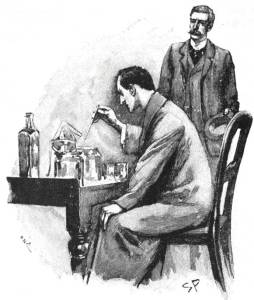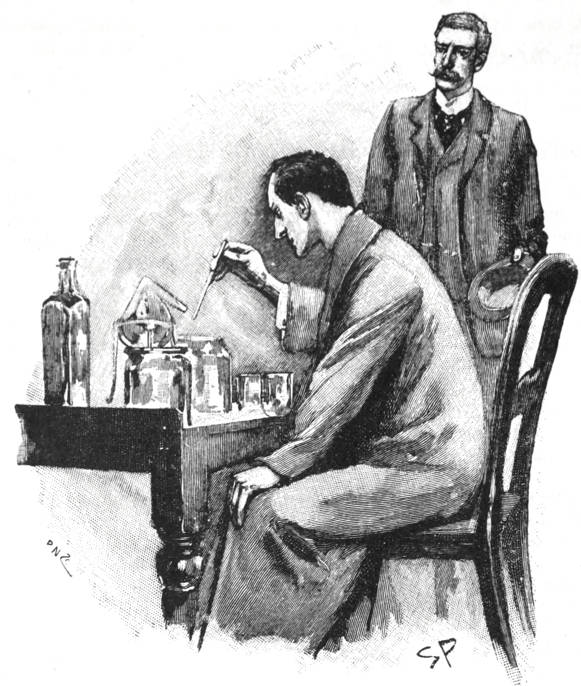
When you meet someone new, and especially when you know you might be spending a long time in their company in future, how do you begin the relationship? Do you try to prime yourself by asking others beforehand? When you meet, what do you say about yourself, to give the other person an idea of who you are? What questions do you ask, to start to discover things about them?
These thoughts occurred to me after re-reading the opening chapter of A study in scarlet, the very first Sherlock Holmes story that Arthur Conan Doyle wrote, in 1887. Dr Watson, the narrator, begins by giving us a short history of his life to date: how he qualified as a medical doctor before joining the British Army and taking part in the Second Afghan War, how he was wounded in battle and invalided home, how he gravitated to London. ‘that great cesspool into which all the loungers and idlers of the Empire are irresistibly drained’, and how he decided he needed to change his life and find a new London home. By chance he meets in a bar ‘young Stamford’, an Army acquaintance, who says that he knows someone looking to share lodgings – he has found them but they are too expensive for him on his own – ‘a fellow who is working in a chemical laboratory up at the hospital’.
The name of the ‘fellow’ is Sherlock Holmes. Stamford immediately issues a word of caution: ‘perhaps you would not care for him as a constant companion’. When Watson asks why, he replies reassuringly that Holmes may be ‘a little queer in his ideas’, and ‘not a man that it is easy to draw out’, but that he is still ‘a decent fellow enough’. Watson implies that as long as Holmes doesn’t disturb his peace he will be content, and the two go together to the hospital to meet Holmes. On the way Stamford’s doubts re-emerge: ‘you mustn’t blame me if you don’t get on with him’. When Watson again presses him, he is clearly unaware of Holmes’s criminological interests, but discloses a little more, this time about his character: ‘Holmes is a little too scientific for my tastes – it approaches to cold-bloodedness’.

At the laboratory they find Holmes huddled over his retorts and Bunsen burners. As soon as he sees them, he springs up and runs towards them, test tube in hand, crying ‘I’ve found it! I’ve found it. I have found a re-agent which is precipitated by haemoglobin, and by nothing else.’ Introduced formally to Watson by Stamford, Holmes’s only words to him are, ‘You have been in Afghanistan, I perceive’.
This is the first example in the Holmes corpus of the ‘observation and deduction’ motif, one repeated so often in later stories. Holmes has an extraordinary ability to notice elements of a stranger’s appearance that elude less observant people, and an equally astonishing ability to deduct or infer conclusions from them, based on an encyclopaedic knowledge of multiple fields of study. Watson responds with the first of many exclamations that echo through the stories: ‘how on earth did you know that?’ There is no answer – and we only learn later how Holmes made the connection with the Afghan War.
But Holmes is back to his chemistry, eager to explain the forensic significance of his new discovery. Stamford finally explains why they’ve come, and Holmes, echoing the list of doubts Stamford mentioned earlier, goes on to warn Watson of some of his characteristics: an addiction to strong tobacco, chemical experiments and violin playing, and a tendency to ‘get in the dumps’ and sit for hours in silence. Watson assures him that none of these trouble him – Holmes has omitted his cocaine addiction – and on the spot the two agree to share the Baker Street lodgings and to meet again the next day to visit them.

You might think that neither man has prepared particularly well for a decision of such importance. (Admittedly, Watson has told Stamford, ‘if we don’t get on it will be easy to part company’) At least Watson has gathered some information, from Stamford beforehand, and from Holmes’s cross-examination during the meeting, and presumably from the sight of Holmes’s workplace. Holmes, on the other hand, seems to have ascertained almost nothing about Watson, beyond his apparent tolerance of Holmes’s admitted failings. How could he possibly know enough about Watson’s background to judge whether sharing common lodgings with him was likely to be a success?
There are two answers, it seems, to this question. The first goes back to Holmes’s startling statement about the Afghan War. That statement, and the fact that the reasoning behind it is never explained, suggest that there may be many other aspects of Watson, his history, habits and character, that Holmes has already discovered for himself through swift, silent observation, without bothering to comment on them or confirm whether he is correct. After all, when the ‘observation and deduction’ motif reappears in the later stories, Holmes doesn’t content himself with just one deduction: for maximum effect he normally piles up several. So it may be that Holmes has wordlessly built a rich picture of Watson’s character, and therefore his suitability as a flatmate.

The other explanation for Holmes’s eccentric approach to personal introduction concerns his own psychology. Many Holmesians have speculated about their hero’s mental conditions. Some diagnose Holmes as what today we would call bipolar, for which there is some evidence, especially his tendency, noted often by Watson, to oscillate between periods of lethargy and silence on the one hand, and hyperactivity, especially when on the track of criminals, on the other. In the introduction, Holmes gives fair warning of his depressive side – ‘[I] don’t open my mouth for days on end’ – though he fails to mention his manic episodes.
The other condition is Asperger’s Syndrome. In Conan Doyle’s day, of course, the condition lacked a label – it was named after the chilly and sinister Austrian psychiatrist Hans Asperger – but Doyle had trained as a doctor and was no doubt familiar with its features. Holmes clearly has difficulty in some kinds of social interaction, and often seems to lack empathy and a concern for the feeling of others. He also has an obsessive interest in the minutiae of narrowly focussed subjects, as in his published analysis of different kinds of cigarette, cigar and pipe ash. This, too, is often characteristic of people with Asperger’s Syndrome. His observational methods could be another indication.
These two explanations of Holmes’s deficient introducing behaviour have their attractions. But in the end, I suspect that it is literary purpose that best accounts for it. Doyle’s aim in the first chapter is to surround the figure of Holmes in a cloud of mystery. As they leave the laboratory Stamford gives Watson some advice: ‘you must study him … You’ll find him a knotty problem, though. I’ll wager he learns more about you that you about him’.
For Watson, in the rest of the novel and in the stories that follow, the clouds of unknowing part from time to time, but to the end Holmes keeps his secrets. We are introduced to him in chapter one of A study in Scarlet, but his character and motivations never become fully readable. Introductions, for him, will never be easy.

Leave a Reply